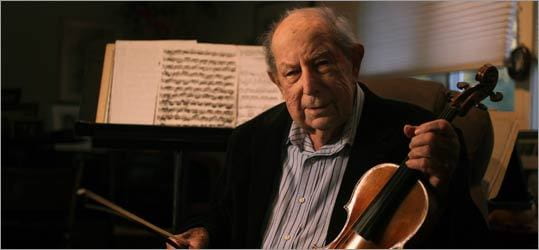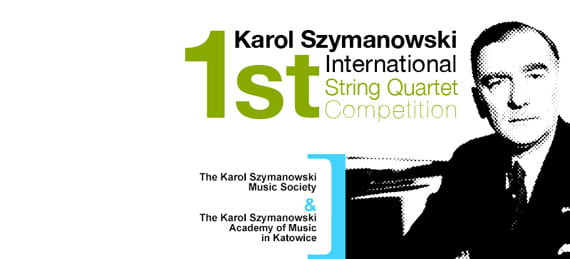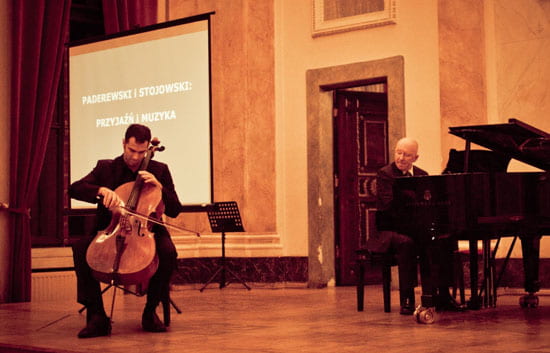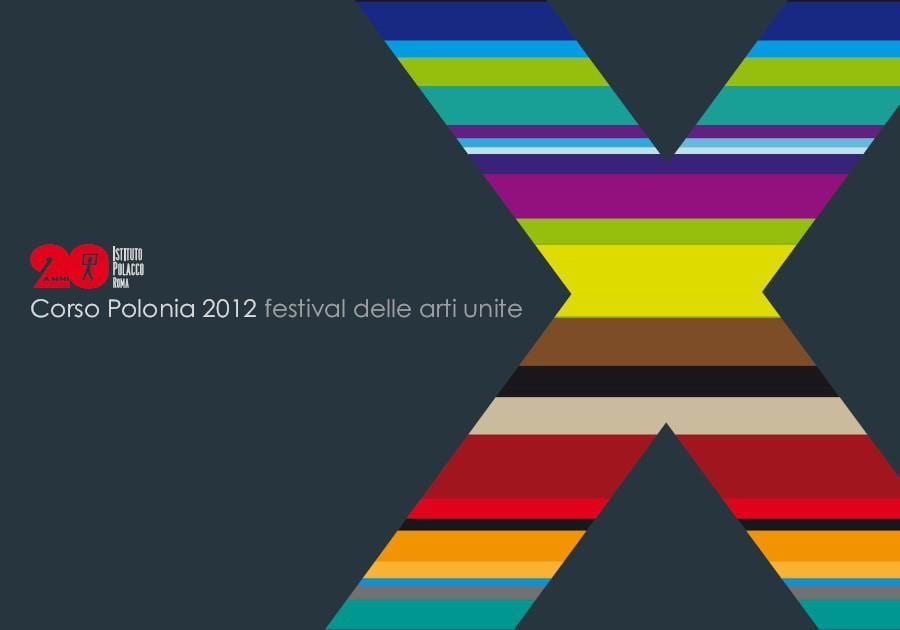Polish Music Newsletter Vol. 18, no. 6
Roman Totenberg In Memoriam
Remembering Roman Totenberg (January 1, 1911 – May 8, 2012)
by Marek Żebrowski
It was a mid-winter evening in the early 1980s. The backstage corridor of Harvard University’s Paine Hall was empty and dark. Roman Totenberg and I waited to go on stage. He was clearly ready to go, but the introductory speeches by various members of the Polish community who organized the event seemed interminable. Panie Marku, kiedy idziemy grac? [Marek, when can we play?], he kept asking and, without waiting for my answer, kept dashing out to check for clues. Well nigh an hour later we were invited on stage. The concern—and scorn on his face—had vanished as soon as he took the violin to his chin. A quick look at me and a twinkle in the eye; finally, we could begin to play.
I met Roman Totenberg in the late 1970s, shortly after graduating from the New England Conservatory of Music in Boston. Mr. Totenberg—we always used a polite form of address in Polish—taught at Boston University and at Longy School of Music in Cambridge. Since I lived on the opposite side of Harvard Square for a long time, visiting him at his corner office at Longy School was very convenient. After a full day of teaching, we would sit down to play Mozart, Beethoven and Brahms, as well as some of Wieniawski’s and Szymanowski violin and piano works.
Occasionally, I went to his Newton home for rehearsals. Once, when I arrived at exactly 10 in the morning, his wife opened the door. “My husband isn’t here,” she said. “But we’ve scheduled a rehearsal,” I replied. “In this case, come in.” Some fifteen minutes later, I heard someone outside. Mr. Totenberg was gingerly navigating an icy walkway to his front steps. In his arms he cradled a huge bag of rock salt. I rushed out, trying to help. He smiled as he began to scatter the stuff around the frozen ground. “I was afraid you’d come here and slip, right in front of my house, so I went to the store. Sorry to be late.”
This was one of our first rehearsals and we were to begin with Szymanowski’s La Fontaine d’Arèthuse. I had prepared carefully for it, knowing that in his youth Mr. Totenberg concertized with Szymanowski. Privately now I was worried about the effect of the heavy bag of salt on Mr. Totenberg’s arms. He took up the instrument, we tuned. A nod and I began. A few bars later, a breathtakingly beautiful, soaring and languorous violin cantilena magically emerged from the shimmering texture of piano accompaniment. I needn’t have worried.
Until that rehearsal, I also thought that Szymanowski’s La Fontaine was a complex and difficult work. Suddenly, as we played it together for the first time, the music seemed to unfold naturally, its gentle ebb and flow building up to passionate climaxes and dissolving into ethereal harmonics with perfect repose. Before I realized, the violin trills faded away and, with two discrete piano notes, we had reached the ending. He looked up, still holding the bow in mid air. “Not bad for the first time,” I heard him say, sotto voce.
His voice was just as unforgettable: a sonorous and gravelly basso whose threatening gravitas was only a ruse. Mr. Totenberg, always a gentleman, could be very direct but never rude. His elegant Polish echoed the glamour of 1930s Poland, in well-turned out phrases and impeccable grammar. It was instantly recognizable from afar. His English was fluent but laced with a strong echo of his Slavic roots. But whatever the language, his sense of humor and timing were impeccable.
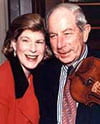 On the phone Mr. Totenberg was always brief. “Panie Marku,” he invariably began, and then stated his case succinctly. “I have a new student,” he said. “She’s from Poland, arrived recently. Good violinist. Perhaps you come to Longy and meet her.” That’s how I met Magdalena Suchecka and soon we were playing Beethoven, Brahms and Prokofiev for Mr. Totenberg. I still remember his gentle and approving smile, when we finished running through Brahms’ D minor Sonata in his studio. Later, after a concert at Longy’s Pickman Hall, Mr. Totenberg was the first to congratulate us. Beaming (“I told you so”) he also introduced his daughter, Nina (pictured at left with her father). It was another unforgettable moment.
On the phone Mr. Totenberg was always brief. “Panie Marku,” he invariably began, and then stated his case succinctly. “I have a new student,” he said. “She’s from Poland, arrived recently. Good violinist. Perhaps you come to Longy and meet her.” That’s how I met Magdalena Suchecka and soon we were playing Beethoven, Brahms and Prokofiev for Mr. Totenberg. I still remember his gentle and approving smile, when we finished running through Brahms’ D minor Sonata in his studio. Later, after a concert at Longy’s Pickman Hall, Mr. Totenberg was the first to congratulate us. Beaming (“I told you so”) he also introduced his daughter, Nina (pictured at left with her father). It was another unforgettable moment.
Thinking of these moments now—just a few days after Mr. Totenberg has left us—I continue to hear his music: forthright, noble, virtuosic, passionate, and lyrical. I’m also left to reflect upon Mr. Totenberg’s legendary experience of nine decades of concertizing, the legacy of his fascinating interpretations, and his transference of tradition from some of the greatest composers of the modern era to scores of younger musicians, a process that enriched so many in his studio and on stage.
Wieniawski’s D major Polonaise de concert closed our Paine Hall program on that wintry night long ago. Dashing, majestic and heartfelt under Mr. Totenberg’s fingers, it catapulted the audience from their seats. Mr. Totenberg bowed politely and shot me an enigmatic smile. This is the magic of music, he seemed to say. Of course it was.
A Tribute to Roman Totenberg
by Gary Fitelberg
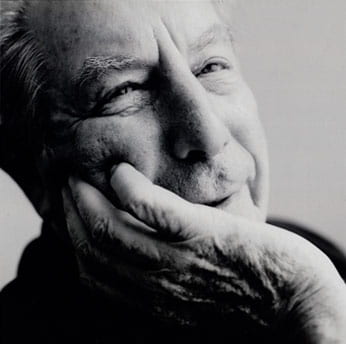 On May 8, 2012, the world lost one of the greatest Polish violinists and virtuosos whose career spanned nine decades. Born on January 1, 1911 (1/1/11), Roman Totenberg was a remarkable man and a singular personality. I was blessed to know this compassionate and generous soul since he was a close friend of the Fitelberg family.
On May 8, 2012, the world lost one of the greatest Polish violinists and virtuosos whose career spanned nine decades. Born on January 1, 1911 (1/1/11), Roman Totenberg was a remarkable man and a singular personality. I was blessed to know this compassionate and generous soul since he was a close friend of the Fitelberg family.
He made his concert debut at the age of 11 under the baton of Grzegorz Fitelberg and premiered Jerzy Fitelberg’s Concerto for Violin and Orchestra some years later. Once I visited Boston to interview Roman Totenberg for a documentary film about Grzegorz Fitelberg, and had the unique honor of receiving an impromptu private recital as well. He was also teaching and hosting a group of his illustrious students for a luncheon. Although not feeling well that particular day, he never thought to cancel our appointment or his teaching engagement.
Roman Totenberg, who had also befriended Karol Szymanowski and Artur Rubinstein, recalled Grzegorz Fitelberg candidly and his affinity extended to the maestro’s son, Jerzy Fitelberg, as well. “In Warsaw I often played with Grzegorz Fitelberg, Brahms’ Concerto and many other works,” Totenberg said to me. “I remember Szymanowski very well,” he continued. “He was very tall, elegant, handsome, and reticent, only speaking quite a bit [in] one-to-one [situations]. In 1933 or ‘34 in Paris I played some of his compositions and he liked it so much that he offered to play a concert with me. We played a recital there and later went to Italy, England, and Scandinavia for about two years of concerts. I was surprised by how well he knew music. When I played a Brahms sonata or something else, he knew exactly what it was and its construction. Grzegorz Fitelberg’s son, Jerzy was composing modern music and I helped him with a work, which I brought over to Szymanowski, who said, ‘Jerzy knows his Stravinsky, doesn’t he?’”
I think Roman Totenberg was referring to the Canzone pour Violon et Piano by Handel-Fitelberg, for which Totenberg edited the violin part. This composition was published in Paris by Editions Max Eschig in 1935. I know he performed Jerzy Fitelberg’s music on a concert in Paris as well, and he surprised me by presenting me with a rare program from that concert.
My adopted brother and good friend Polish violinist Hubert Pralitz recalls Totenberg fondly and with great reverence: “I once met Roman Totenberg in Gdańsk. I was a young violinist. It was truly remarkable that he let me play his Stradivarius. This was the first and only time I ever had the opportunity to play on such a fine instrument.”
Roman Totenberg’s charismatic and charming, generous, inspirational and patient nature left its mark on all those who were blessed and honored to have known him personally. His smile and his sense of humor were truly infectious. We will miss the man, his personal magic and his music. His legacy will remain in our hearts, minds and souls.
Tributes & Obituaries From Around The World
“It’s a remarkable death,” said Totenberg’s daughter, the NPR journalist Nina Totenberg. “He’s not going to go quickly — he has work to do.”
National Public Radio (two tributes by Nina Totenberg): Roman Totenberg’s Remarkable Life And Death and Roman Totenberg: A Musical Life Remembered
The New York Times: www.nytimes.com
The Boston Globe (Associated Press): www.boston.com
The Boston Musical Intelligencer: classical-scene.com
Boston University: www.bu.edu
PMC News
New PMC Donations
Pilatowicz Donation
Polish-born writer Maria Pilatowicz—whose new novel Walking on Ice was published in April—and her husband Edward Pilatowicz made a significant donation of music and books about music to the Polish Music Center earlier this spring. The centerpiece of her score collection includes Chopin’s Ballades, Sonatas, Nocturnes, Polonaises as well as some other, shorter works, published by PWM. There are also a few scores and collections of salon music by Paderewski, songs by Mieczysław Karłowicz and Grażyna Bacewicz, and a selection of piano music by the mid-twentieth century composers like Barbara Niewiadomska, Joachim Olkuśnik, Edward Pałłasz, and Romuald Twardowski. The Pilatowicz donation also features songbooks with music from the Highlands, Silesia, and Mazovia regions as well as two historical anthologies of songs from the nineteenth century and the years 1914-1939.
This donation also includes quite a few music-related books. The highlight amongst these books are biographies of Feliks Nowowiejski by Jan Boehm, Franz Liszt by Stanisław Dybowski, J.S. Bach and W.A. Mozart by Jarosław Iwaszkiewicz, another entry on Mozart by Stefan Jarociński, Karol Szymanowski by Jerzy Waldorff and Jan Kiepura by Jan Zieliński. Memoirs by Paderewski and Rubinstein are also on this list, alongside those of a popular poet and songwriter, Jeremi Przybora.
The scores and books will certainly add more depth and variety to our library holdings. Thank you, Ms. Pilatowicz. Dziękujemy!
More Materials from Joanna Bruzdowicz
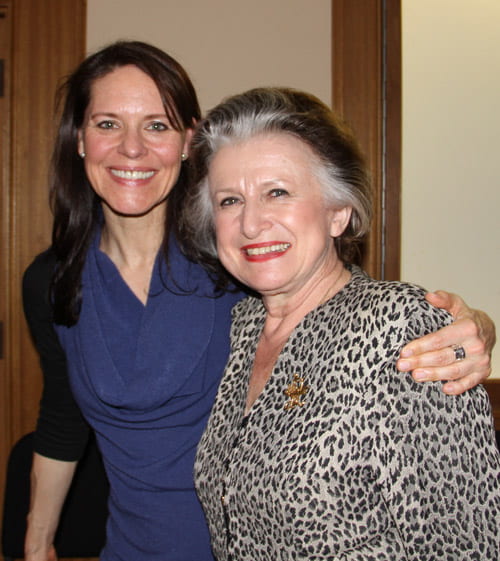
Photo: Krysta Close, PMC Archives
Another round of donations from composer Joanna Bruzdowicz to the Polish Music Center continues to add to our library and enrich our research materials. This most recent giftincludes scores of Episode pour piano et treize cordes and the SymphonyNo.2 “Concertino pour orchestre symphonique.”We also received the historic world premiere LP recording of Ms. Bruzdowicz’s musical drama,La Colonie Pénitentiare, featuring the orchestra and soloists of the Belgian Radio and Television Orchestra under the baton of Maestro Jacek Kasprzyk. Joanna Bruzdowicz had also donated the program booklet from the performance of Lella—Oratorio profane pour voix de femmes,premiered at the Rencontres Musicales de Méditerranée in Corsica in November 2011 and two booklets with information about the 2011 and the 2012 Festival of Polish Film organized and directed by Ms. Bruzdowicz at the Cinéma Castillet in Perpignan.
We also want to acknowledge the receipt of the Spring 2012 issue of the VivaVoce—Frau und Musik magazine that leads with a feature article and an interview about Joanna Bruzdowicz’s longstanding musical collaborations with film director Agnès Varda. All of these materials shed light on Ms. Bruzdowicz’s busy musical life and her active support of Polish culture in southern France. Dziękujemy!
Scores from the 2012 Festival of Premieres
The PMC Festival of Premieres in late March featured music by composers from Poland and Lithuania. Now the score of UN-intermezzi for solo piano by Veronika Kraus has been donated to our library by the composer. This fascinating group of five piano pieces was world-premiered by pianist Aron Kallay at Newman Recital Hall on March. Veronika has been a long-time supporter and collaborator as well as the supplier of excellent tea to the Polish Music Center. Ačiū! Thank you, Veronika!
News
Premieres – Warsaw Music Encounters
 On May 12-19, the Warsaw Music Encounters—an annual festival of old and new music—was held. The creator and director of the Festival is composer Władysław Słowiński, and it is organized by the Warsaw Branch of the Polish Composers’ Union. Concerts were held at the Royal Castle, the Witold Lutosławski Concert Studio of Polish Radio, the Evangelical Reformed Church and the Mazovian Centre of Culture and the Arts and included chamber works by contemporary composers such as Paweł Łukaszewski, Władysław Słowiński, Tadeusz Baird, Krzysztof Penderecki, Miłosz Bembinów and others, as well as works by Josquin des Prez and Johannes Ockeghem.
On May 12-19, the Warsaw Music Encounters—an annual festival of old and new music—was held. The creator and director of the Festival is composer Władysław Słowiński, and it is organized by the Warsaw Branch of the Polish Composers’ Union. Concerts were held at the Royal Castle, the Witold Lutosławski Concert Studio of Polish Radio, the Evangelical Reformed Church and the Mazovian Centre of Culture and the Arts and included chamber works by contemporary composers such as Paweł Łukaszewski, Władysław Słowiński, Tadeusz Baird, Krzysztof Penderecki, Miłosz Bembinów and others, as well as works by Josquin des Prez and Johannes Ockeghem.
As always, several premieres were presented in the concert hall of Warsaw’s Royal Castle as a part of the Festival’s program. On May 17, Grzegorz Duchnowski’s Wariacje kurpiowskie for string orchestra, Edward Sielicki’s Differentia specifica (Una fantasia quasi tango) for soprano saxophone and string orchestra (2006/2009), and Krzesimir Dębski’s Trois nouvellettes for strings (2012) were given their world premieres by the Chamber Orchestra of the Warsaw National Philharmonic, with conductor Krzysztof Słowiński and saxophonist Alina Mleczko. On May 19, the Wilanów Quartet premiered Władysław Słowiński’s Funebre for string quartet (2012).
According to Festival organizers:
Warsaw Music Encounters is one of the most important festivals of early and new music, but also the first and only one that has made it a principle to combine these two on a regular basis. Thanks to this principle, the Festival provides an opportunity for many early music enthusiasts to get acquainted with contemporary works and discover that they “don’t bite” after all. The Festival admittedly does not map out new trends in music and does not cause scandals, but it is an enjoyable and exciting way of spending time and an opportunity to listen to engaging compositions, both well known and quite new ones. It also provides a chance to meet many interesting personalities, outstanding composers and talented artists.
[Source: pwm.com.pl, wsm.art.pl]
LAMC’s Tribute To Górecki
 The Los Angeles Master Chorale (LAMC) concludes its 48th season with a heartfelt, mostly a cappella tribute to celebrated Polish composer Henryk Mikołaj Górecki on Sunday, June 10, 2012, 7 pm, at Walt Disney Concert Hall. Led by music director Grant Gershon, the Grammy-nominated Master Chorale is recognized as one of the Los Angeles’s cultural treasures and one of the world’s premier choruses.
The Los Angeles Master Chorale (LAMC) concludes its 48th season with a heartfelt, mostly a cappella tribute to celebrated Polish composer Henryk Mikołaj Górecki on Sunday, June 10, 2012, 7 pm, at Walt Disney Concert Hall. Led by music director Grant Gershon, the Grammy-nominated Master Chorale is recognized as one of the Los Angeles’s cultural treasures and one of the world’s premier choruses.
 Frequently compared in musical style to Arvo Pärt and John Tavener, Henryk Mikołaj Górecki is noted for the rapturous simplicity and monumental emotional power of his music. Since Mr. Górecki’s death on November 12, 2010 at the age of 76, an urgent interest in preserving and savoring his choral work inspired this concert, which will be recorded as LAMC’s next Decca CD for release in fall 2012.
Frequently compared in musical style to Arvo Pärt and John Tavener, Henryk Mikołaj Górecki is noted for the rapturous simplicity and monumental emotional power of his music. Since Mr. Górecki’s death on November 12, 2010 at the age of 76, an urgent interest in preserving and savoring his choral work inspired this concert, which will be recorded as LAMC’s next Decca CD for release in fall 2012.
LAMC will perform Górecki’s Five Marian Songs, Lobgesang (with glockenspiel) and Miserere, in addition to Schaffe in mir, Gott, ein rein Herz by Johannes Brahms. Grant Gershon programmed Górecki’s Miserere during his very first season as Music Director, generating a wildly enthusiastic audience response. The work starts with the low basses chanting the melody for about three minutes, then building layer upon layer until the full choir swells to a stunning sonic conclusion.
Sunday, June 10, 2012 | 7:00 pm
LAMC Tribute to Górecki
Walt Disney Concert Hall
111 S. Grand Ave., Los Angeles, CA 90012
Tickets: $24 – $134
Tickets and info: (213) 972-7282 or www.lamc.org
[Sources: musiccenter.org, boosey.com, lamc.org]
New Edition Of Quarta
 The new edition of Quarta [Kwarta]—the English- and Polish-language quarterly dedicated to the latest happenings in Polish music—has been published by PWM Editions. Available online in its entirety at issuu.com, the most recent issue is dedicated to Wojciech Kilar on his 80th birthday. In addition to articles such as “The aesthetic voyage of Wojciech KILAR” and “Wojciech KILAR’s sacred works,” this edition of Quarta also includes discussions of “Agata ZUBEL on her new works and immediate plans” and “Elżbieta SIKORA’s recent works,” including the opera Madame Curie.
The new edition of Quarta [Kwarta]—the English- and Polish-language quarterly dedicated to the latest happenings in Polish music—has been published by PWM Editions. Available online in its entirety at issuu.com, the most recent issue is dedicated to Wojciech Kilar on his 80th birthday. In addition to articles such as “The aesthetic voyage of Wojciech KILAR” and “Wojciech KILAR’s sacred works,” this edition of Quarta also includes discussions of “Agata ZUBEL on her new works and immediate plans” and “Elżbieta SIKORA’s recent works,” including the opera Madame Curie.
A quote from the lead article:
[W]hen one looks at the history of Polish music within this time-frame (1955-2012…), Wojciech Kilar comes across an exceptional figure in composition. A figure which is essentially a paradox – exceptional and emblematic at the same time.
Though born in 1932 (on July 17th in Lviv), Wojciech Kilar has been considered part of a phenomenon called ‘Born in 1933’ of which Krzysztof Penderecki and Henryk Mikołaj Górecki are also a part of (both actually born in ’33). The debuts of these three composers in the late ‘50s at the newly sprung ‘Warsaw Autumn’ all tasted of sensation. The concept of the ‘Polish School of Composition’ was born, also in reference to older composers as such as Grażyna Bacewicz, Witold Lutosławski, Włodzimierz Kotoński, Kazimierz Serocki, Bogusław Schaeffer and Tadeusz Baird.
Also on PWM’s website are interviews with two of the film directors with whom Kilar has worked closely. Click on the names of Krzysztof Zanussi and Andrzej Wajda to watch the interviews.
[Source: pwm.com.pl]
New MKiDN Project: Commissioned Compositions
 On May 18, the Polish Minister of Culture and National Heritage (MKiDN) announced a new program to commission new works from composers under the auspices of MKiDN. This project is being managed by the Institute of Music and Dance.
On May 18, the Polish Minister of Culture and National Heritage (MKiDN) announced a new program to commission new works from composers under the auspices of MKiDN. This project is being managed by the Institute of Music and Dance.
The objective of this program is to create new musical works as well as provide for the first performances, their marketing, public dissemination, and also for its use as a tool for cultural and artistic education. The subject of the program pertains to works by Polish or foreign composers whose works will be premiered in Poland or abroad.
The Commissioned Compositions project is intended to stimulate musical creativity and promote its presence in public arena. Musical works commissioned through this project will serve as a valuable tool for cultural and artistic education. They will also contribute to the building of relationships with various segments of the public, including children and youth.
Applications for the program can be submitted by state and local cultural institutions, NGOs, church organizations, religious associations, as well as business entities. The program budget is 2 million PLN [ca. $700,000].
Submissions can be filed electronically beginning May 25. The call for applications will close June 29, 2012. Detailed information and instructions are available on the website of the Ministry of Culture and National Heritage: www.mkidn.gov.pl
[Sources: polmic.pl, mkidn.gov.pl, imit.org.pl]
PWM’s Ochlewski Competition
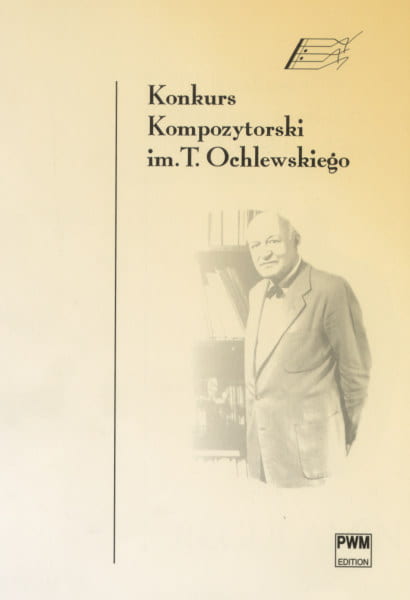 This year’s 10th edition of the Tadeusz Ochlewski Competition is dedicated to Wojciech Kilar on his 80th birthday. The objective of the competition is an original composition for the string orchestra.
This year’s 10th edition of the Tadeusz Ochlewski Competition is dedicated to Wojciech Kilar on his 80th birthday. The objective of the competition is an original composition for the string orchestra.
The Tadeusz Ochlewski Competition is organized by the Polish Music Publishers (PWM) as a part of their mission to promote young composers. The patron of the project is the founder of PWM, Tadeusz Ochlewski, who enlivened the musical life in Poland as an educator and violinist.
The deadline for entries is July 31, 2012. For more information, rules of the competition and application forms, visit: www.pwm.com.pl.
[Source: pwm.com.pl
1st Int’l Szymanowski Composition Competition
In the year of the 130th anniversary of Karol Szymanowski’s birth, the first edition of a new composition competition in the composer’s name will be held. Organized by the Karol Szymanowski Music Society in collaboration with the Karol Szymanowski Academy of Music in Katowice, the subject of the Karol Szymanowski International Composers Competition is a piece for symphony orchestra, of duration between 10-16 minutes. Entries must be submitted by November 30, 2012. Results will be announced on December 12, 2012 and the prize-winning works will be performed in Kraków and Katowice through 2013 and 2014.
Prizes:
- I Prize –15.000 zł
- II Prize –10.000zł
- III Prize – 5.000 zł
- NOSPR Special Prize – performance of the awarded works at the Festival of Premieres, Katowice 2013 or performance of one of the awarded compositions in 2013 – 2014
- Prize of Karol Szymanowski Philharmonic in Cracow – performance of one of the awarded compositions in 2013 – 2014
- Prize of His Magnificence Rector of Karol Szymanowski Academy of Music in Katowice – performance of one of the awarded compositions by the Karol Szymanowski Academic Symphony Orchestra in 2013 – 2014
- Special Prize of National Forum of Music and Wrocław Philharmonic – concert subscription (season ticket) for Festival Musica Electronica Nova, Wrocław 2013
- PWM Special Prize – a complete set of contemporary Polish music scores
- ZKP Special Prize – subscription to all concerts of the 2012 ‘Warsaw Autumn’ International Festival of Contemporary Music, funded by the Main Board of the Polish Composers’ Union (ZKP)
For more details on application and submission for this competition, please visit: http://212.106.177.32/szymanowski/competition-rules.html.
[Source : pwm.com.pl]
Romantic Music Across Europe
Cellist Lars Hoefs and pianist Marek Zebrowski will present a recital of works by European composers from the romantic era at the Glendale City Second Adventist Church, 610 East California Ave, Glendale, CA on June 9 at 4 p.m. Composers on this Second Saturday Concert Series program hail from Poland, Germany and Spain, with works including Zygmunt Stojowski – Concertstück, Ignacy Jan Paderewski – Three Miniatures (arr. M. Zebrowski), Robert Schumann – Fantasiestücke, Manuel de Falla – Suite Popular Espagñola, Erich Wolfgang Korngold – Cello Concerto, and Frederic Chopin – Polonaise brilliante. Admission is free with donations accepted at the door. A reception for the audience and the artists will be held in the courtyard following the concert.
In late August and September 2012, Mr. Hoefs and Mr. Zebrowski will present a similar selection of works for cello and piano at festivals and concerts in southern France, Italy, the Ukraine and Poland.
Saturday, June 9 at 4:00 p.m.
“Romantic Music Across Europe” – Lars Hoefs, cello and Marek Zebrowski, piano
Glendale City Second Adventist Church
610 East California Ave, Glendale, CA
Admission: Free
A reception will follow the concert
[Sources: press release, glendalecitysda.com]
Grella-Możejko: Pod
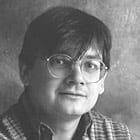 Set to atmospheric and at times relentlessly rhythmic computer music by internationally acclaimed composer Piotr Grella-Możejko, Pod evokes images of one unknown organism growing and evolving in to two separate entities who struggle to break free from the environment they were created in. Watch them gain freedom and transform with each moment. Experience with them as they come to terms with all the complications that their consciousness brings.
Set to atmospheric and at times relentlessly rhythmic computer music by internationally acclaimed composer Piotr Grella-Możejko, Pod evokes images of one unknown organism growing and evolving in to two separate entities who struggle to break free from the environment they were created in. Watch them gain freedom and transform with each moment. Experience with them as they come to terms with all the complications that their consciousness brings.
Choreographed by Alida Nyquist Schultz, Pod is the first full length work of the Good Women Dance Collective. The collaboration with Grella-Mozejko has been truly inspiring for the company and has taken their artistic vision to dark and mysterious places that the collective has not yet explored. Pod is performed by Ainsley Hillyard and Raena Waddell, presenting a dynamic journey of mitosis, dependence and separation anxiety.
The Good Women Dance Collective is a non-profit society formed in Edmonton by Ainsley Hillyard, Alida Nyquist-Schultz and Alison Towne. Their goal is to produce innovative and exciting choreographic works with integrity and conviction, with a mandate to provide education and performance opportunities for artists working in Edmonton.
This production is in part made possible by generous grants and donations in kind from the Alberta Foundation for the Arts, Edmonton Arts Council, Art Gallery of Alberta, Polish Culture Society of Edmonton, and Good Women’s volunteers.
June 9 and 10 | 8:00pm
Pod – A collaboration between Good Women & Piotr Grella-Mozejko
Ledcor Theatre – Art Gallery of Alberta
Tickets: $20 general, $15 student/senior – www.tixonthesquare.ca
[Source: press release]
Augustyn @ KF
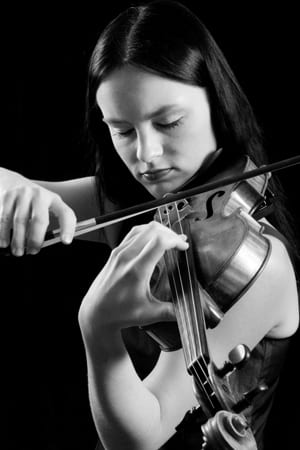 On June 3, the Kosciuszko Foundation presents a recital by violinist Kinga Augustyn and pianist Jasna Popovic. They will perform “La Fontaine d’Aréthuse” from 3 Mythes for violin and piano, Op.30, by Karol Szymanowski, as well as works by Pablo de Sarasate, Elliott Carter, Béla Bartók and Ludwig van Beethoven.
On June 3, the Kosciuszko Foundation presents a recital by violinist Kinga Augustyn and pianist Jasna Popovic. They will perform “La Fontaine d’Aréthuse” from 3 Mythes for violin and piano, Op.30, by Karol Szymanowski, as well as works by Pablo de Sarasate, Elliott Carter, Béla Bartók and Ludwig van Beethoven.
Sunday, June 3, 2012 | 3:00 pm
Violin & Piano Recital – Kinga Augustyn and Jasna Popovic
Kosciuszko Foundation
$20 – $15 KF Members and Students
Info: www.thekf.org
[Sources: thekf.org]
Awards
White Eagle For Kilar
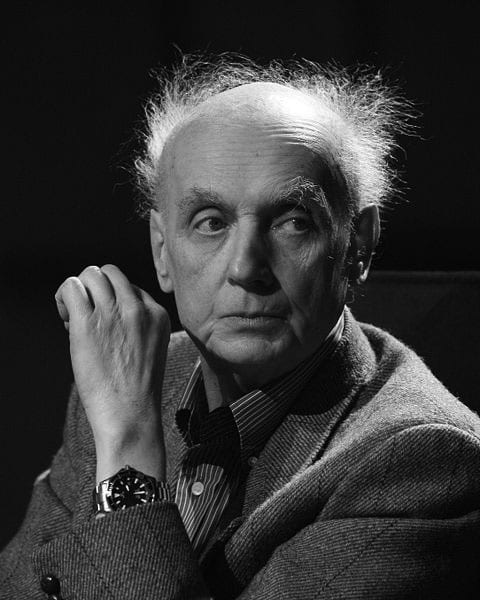 On the 221st anniversary of the Polish Constitution of May 3, President of the Republic of Poland, Bronislaw Komorowski, presented several momentous honors to distinguished members of Poland’s music community at a ceremony in the Royal Castle in Warsaw. Amongst the honorees inducted into the Order of the White Eagle—the highest order of the Republic of Poland—was:
On the 221st anniversary of the Polish Constitution of May 3, President of the Republic of Poland, Bronislaw Komorowski, presented several momentous honors to distinguished members of Poland’s music community at a ceremony in the Royal Castle in Warsaw. Amongst the honorees inducted into the Order of the White Eagle—the highest order of the Republic of Poland—was:
- composer Wojciech Kilar “in recognition of distinguished contribution to Polish culture and for excellence in creative work.”
Also at the same ceremony, awards were also given to:
- trumpet player and jazz arranger Tomasz Stańko, who received the Commander’s Cross of the Order of the Polish Renaissance “for outstanding contribution to national culture and achievements in artistic creation”
- cultural organizer and music promoter Elżbieta Penderecka and composer Zbigniew Preisner, who received the Officer’s Cross of the Order of the Polish Renaissance “for outstanding achievements in the promotion and dissemination of Polish and world culture, and for artistic and creative achievements
[Sources: wojciechkilar.pl , prezydent.pl]
Skrowaczewski Honored
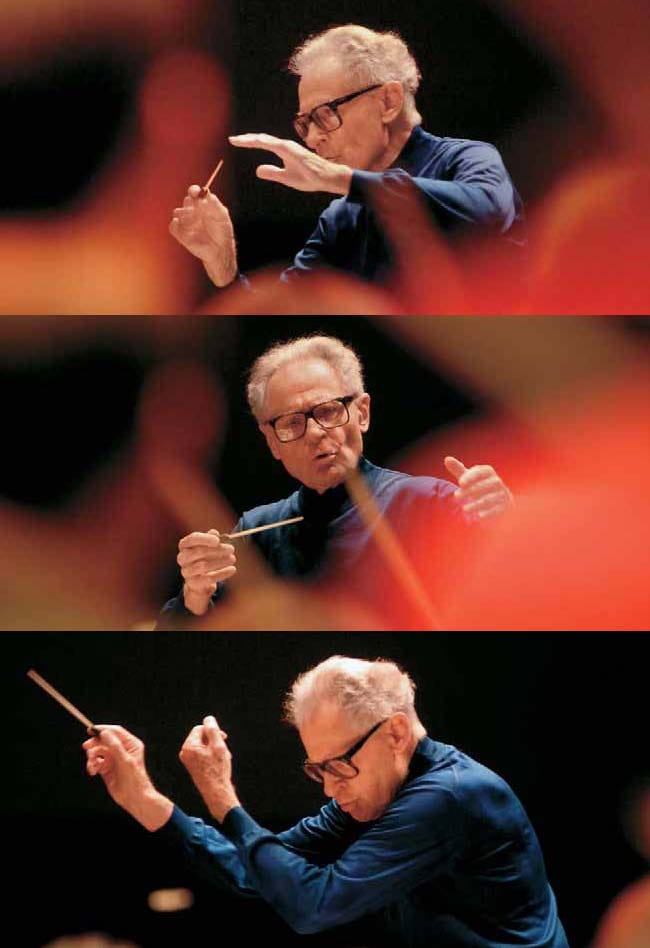 On April 19, the Bruckner Society of America and presented eminent international conductor Stanisław Skrowaczewski with the Kilenyi Medal of Honor for “exemplary work in furthering the understanding and appreciation of the life and work of Anton Bruckner” before a full house at Orchestra Hall in Minneapolis. The award was presented by John Berky during Skrowaczewski’s return visit as the laureate conductor of the Minnesota Orchestra, when he also directed a wonderful performance of Anton Bruckner’s Symphony No. 8. Read a full report on the award ceremony as recalled by Berky on abruckner.com
On April 19, the Bruckner Society of America and presented eminent international conductor Stanisław Skrowaczewski with the Kilenyi Medal of Honor for “exemplary work in furthering the understanding and appreciation of the life and work of Anton Bruckner” before a full house at Orchestra Hall in Minneapolis. The award was presented by John Berky during Skrowaczewski’s return visit as the laureate conductor of the Minnesota Orchestra, when he also directed a wonderful performance of Anton Bruckner’s Symphony No. 8. Read a full report on the award ceremony as recalled by Berky on abruckner.com
Then, on May 17, Maestro Skrowaczewski received an honorarydoctorate from the Karol Szymanowski Music Academyin Katowice, Poland. The following day, Maestro Skrowaczewski led the National Symphony Orchestra of the Polish Radio (NOSPR) in a performance in their Katowice residence, Grzegorz Fitelberg Hall. The concert program included Bruckner’s Ninth Symphony and Stanisław Skrowaczewski’s Music for Winds—the latter piece was co-commissioned by the USC Thornton School of Music and was given its US West Coast premiere at USC on October 30, 2011, by the USC Thornton Wind Ensemble.
This is not the first time Maestro Skrowaczewski’s masterful interpretations of Bruckner’s Symphonies have brought him recognition. Skrowaczwski’s recordings of Bruckner’s eleven symphonies for the Arte Nova label were honored with an award for the Best Recording in Symphonic Music of the eighteenth and nineteenth century in Cannes, France in 2002.
To see a video of Maestro Skrowaczewski’s performance of Bruckner’s Symphony No. 3 in D minor (1889 version) with the Berlin Philharmonic in May of 2011, visit www.digitalconcerthall.com.
[Sources: polmic.pl, nospr.org.pl, abruckner.com, digitalconcerthall.com]
Annual ZKP Awards
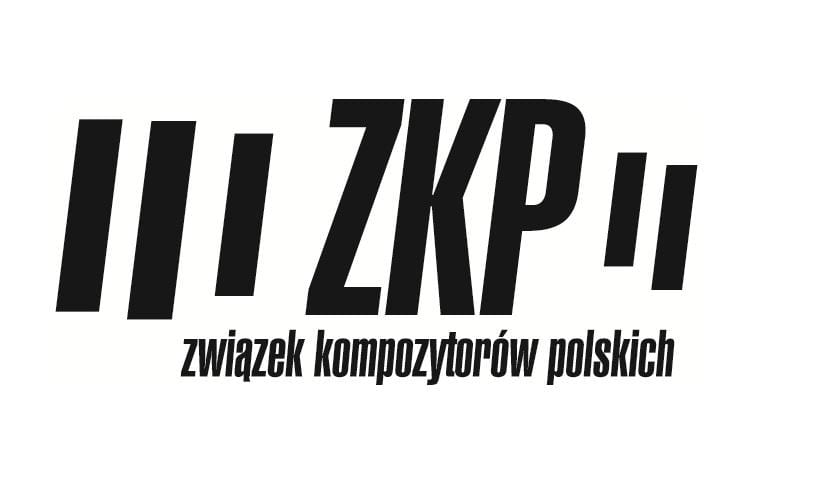 The Polish Composers’ Union (ZKP) granted its Annual Awards on Tuesday, May 22. The Jury was chaired by Zofia Helman and included Paweł Gancarczyk, Krzysztof Knittel and Władysław Słowiński.
The Polish Composers’ Union (ZKP) granted its Annual Awards on Tuesday, May 22. The Jury was chaired by Zofia Helman and included Paweł Gancarczyk, Krzysztof Knittel and Władysław Słowiński.
The 2012 winners of the ZKP Annual Award are:
- Sławomira Żerańska-Kominek – for her outstanding scientific contribution to the expanding research area of musicology.
- Roman Berger – for his outstanding creativity as a composer and inspiring publications in the area of philosophy and music theory.
- Cezary Duchnowski – for his exceptional accomplishments in the area of electronic music and teaching activities
The awards will be presented during the 55th Warsaw Autumn Festival, to be held from September 21-29, 2012.
[Sources: polmic.pl, zkp.org.pl]
2012 Tadeusz Baird Competition
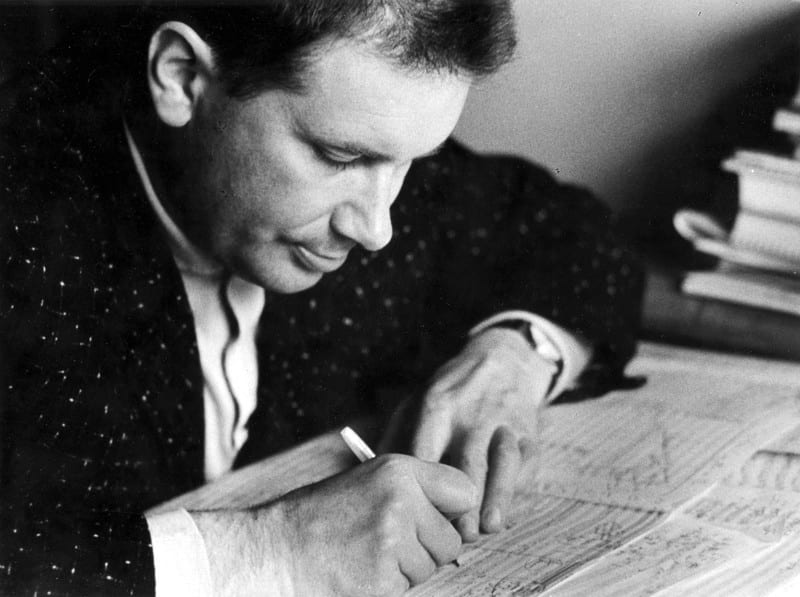 The Tadeusz Baird Competition for Young Composers (formerly the ZKP Youth Competition) has been organized annually by the Polish Composers’ Union since 1958. Its aim is to help young Polish composers launch their careers and to encourage their independent activity. After listening to the final concert of works that were advanced to the second round of the 2012 Competition, the jury of the 53rd edition of Tadeusz Baird Competition for Young Composers announced their verdict on May 31. Chaired by Zbigniew Bagiński and assisted by Zbigniew Bargielski and Miłosz Bembinow, the jurors awarded the Tadeusz Baird Main Prize of $2,500 to:
The Tadeusz Baird Competition for Young Composers (formerly the ZKP Youth Competition) has been organized annually by the Polish Composers’ Union since 1958. Its aim is to help young Polish composers launch their careers and to encourage their independent activity. After listening to the final concert of works that were advanced to the second round of the 2012 Competition, the jury of the 53rd edition of Tadeusz Baird Competition for Young Composers announced their verdict on May 31. Chaired by Zbigniew Bagiński and assisted by Zbigniew Bargielski and Miłosz Bembinow, the jurors awarded the Tadeusz Baird Main Prize of $2,500 to:
- Piotr Tabakiernik for Paroles gelées
The Main Competition Prize was sponsored by Alina Sawicka-Baird, the composer’s widow. Piotr Tabakiernik is a composer and graduate of the Chopin University in Warsaw who has already garnered a number of prizes for composition in competitions held in Poland and abroad.
Three other works received honorable mention awards in the 2012 Competition: SaHarBad by Maria Huszcza, Strzępy sny by Kamil Kruk, and Enigma A.D. 2011 by Dominik Lewicki.
The challenge for this edition of the Competition was to compose a work for any two instruments that is based on the motif “B A D D,” that represents a musical cryptogram of Tadeusz Baird’s name.
For composers’ biographies in Polish, visit: www.zkp.org.pl
[Sources: polmic.pl, zkp.org.pl]
Saxophone Competition In Łódź
The 2nd International Saxophone Competition Łódź was held from April 28-May 4, 2012. The organizer of the Competition is the Grażyna and Kiejstut Bacewicz Academy of Music in Łódź. The primary goal of the Competition is to present young saxophone players from all over the world, raising the level of this relatively young field of instrumental studies through the exchange of experience and the comparative assessment of participants.
The 1st International Saxophone Competition, which took place three years ago, gathered more than 60 participants (including 20 Poles) from four continents. Members of the 2012 Jury were: Mieczysław Stachura (Poland) – Chairman; David Pituch (USA) – Vice Chairman; Paweł Gusnar (Poland); Jérôme Laran (France); Mario Marzi (Italy); and
Andrzej Rzymkowski (Poland)
Competitors are judged in two age groups over the course of three rounds. The main prizes are Selmer France alto and soprano saxophones.
The 2012 winners are:
GROUP I (born after May 4, 1991)
- 2nd prize: Szymon Zawodny (Poland)
- 3rd prize: Hayrapet Aralelyan (Armenia)
- Distinctions: Roman Fotuima (Ukraine) and Aleksandar Jankech (Serbia)
GROUP II (born after May 4, 1983)
- 1st prize: Xavier Larsson-Paez (Spain)
- 2nd prize: Bartłomiej Duś (Poland)
- 3rd prize: Elisa Urrestarazu Capellan (Spain)
[Source: amuz.lodz.pl]
Festivals
Enter Music Festival
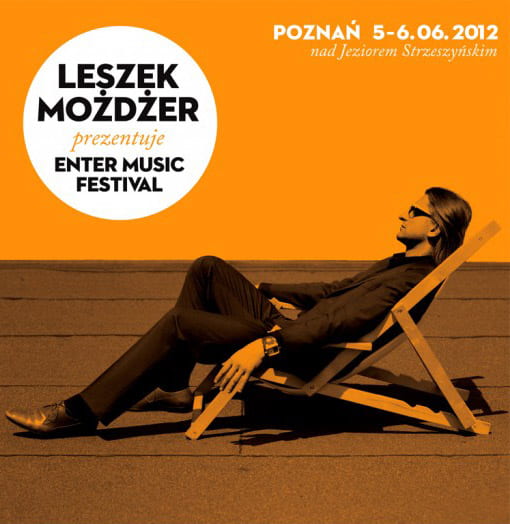 The Enter Music Festival (June 5-6, 2012) is a two-day music event that allows the most interesting jazz musicians of today to meet on one stage. “Enter” means action, change, a step forward, progress, activity, but first of all the present and the sign of our time. This is precisely the nature of this new annual music festival that was added to the cultural map of Poznań against the background of Lake Strzeszyńskie in 2011.
The Enter Music Festival (June 5-6, 2012) is a two-day music event that allows the most interesting jazz musicians of today to meet on one stage. “Enter” means action, change, a step forward, progress, activity, but first of all the present and the sign of our time. This is precisely the nature of this new annual music festival that was added to the cultural map of Poznań against the background of Lake Strzeszyńskie in 2011.
The artists selected by the Festival’s Artistic Director Leszek Możdżer often differ significantly from one another. The Festival presents a panorama of music energy that oscillates stylistically around jazz and that is perfectly suited for a less formal, open-air ambience. Leszek Możdżer himself shares his art with the audience in an informal natural setting, where he introduces his most recent or recently arranged music projects. This year’s lineup includes: Edmar Castañeda Trio, Lutosphere [Leszek Możdżer / Andrzej Bauer /M.Bunio.S], Nils Landgren Funk Unit, Atom String Quartet, Libretto Lars Danielsson Quartet, and Cellonet + Leszek Możdzer.
Enter Music Festival reminds us that jazz offers freshness and dynamism and is a field for ever new pursuits. It is a music space which calls for continuous action and a constant discovery of new paths. The artists presented during the Festival boldly accept these challenges and share with the audience the effects of their creative endeavors.
[Sources: meakultura.pl, enterfestival.pl]
Gaude Mater Festival 2012
 During the first week of May, the Polish town of Częstochowa was at the center of cross-cultural dialogue when over 800 performers from 13 different countries participated in the 22nd International Festival of Sacred Music Gaude Mater. Organized in the spiritual capital of Poland for over 20 years, Gaude Mater is a musical showcase of the city and the region. Since its beginning, the Festival’s main aim is presentation of the music of three greatest monotheistic religions: Christianity, Judaism and Islam. During this biggest of music events in the Śląsk region, Częstochowa’s holy spaces resonated with music of various religions, ages and styles.
During the first week of May, the Polish town of Częstochowa was at the center of cross-cultural dialogue when over 800 performers from 13 different countries participated in the 22nd International Festival of Sacred Music Gaude Mater. Organized in the spiritual capital of Poland for over 20 years, Gaude Mater is a musical showcase of the city and the region. Since its beginning, the Festival’s main aim is presentation of the music of three greatest monotheistic religions: Christianity, Judaism and Islam. During this biggest of music events in the Śląsk region, Częstochowa’s holy spaces resonated with music of various religions, ages and styles.
Gaude Mater is dedicated to the promotion of Polish composers and, during the inaugural concert on May 1, Wojciech Kilar, one of Poland’s most recognized composers, celebrated his 80th birthday. 300 performers participated in the concert in the Basilica of Jasna Góra, including the combined choirs of the Polish Federation of “Pueri Cantores” and the Philharmonic Orchestra, in performance featuring Bogurodzica, Angelus and Exodus. The concert was preceded by the opening of Zdzisław Sowiński’s photo exhibit dedicated to Wojciech Kilar.
An evening performance at the Church of the Holy Name of Mary was dedicated to sacred music played with unusual instruments. The Austrian duo Wiener Glasharmonika opened the world of glass sounds performed on the glass harmonica and verrophone. The unique instrumental approach to the program included another concert for fans of panpipes, during which the Moldovan virtuoso Stefan Negura performed with the Traffic Strings Quintet from Romania.
This year’s festival featured such stars as the Akademie für Alte Musik Berlin, Shmuel Barzilai – Head Cantor of the Vienna Synagogue, and the ensemble “Gregorian.” Cosmic Voices from Bulgaria, one of the most famous Bulgarian choirs known for its unusual sound, also charmed the listeners during the performance at the Częstochowa Orthodox Church on May 5. The group consists of 18 female vocalists, carefully selected in numerous auditions held throughout Bulgaria.
An important Festival goal is to support young artists and, to this end, the Festival and the together with Musica Sacra Institute in Warsaw organizes an International Composers Competition for a sacred piece with Latin text for mixed a cappella choir. The winners of this year’s competition— Bartosz Kowalski (Poland) – Rex tremendae majestatis, Phillip Armstrong Cooke (UK) – O salutaris hostia, Michał Malec (Poland) – Salve Regina, and Douglas Gary Pew (USA) – Agnus Dei—were presented their awards and the prize winning pieces were performed at a Festival concert on May 3.
Another event associated with the Festival is Ethnight (April 28-30, 2012), which this year celebrated the cultures of Egypt, Norway and Catalonia. Ethnight events serve as a fundraisers for the water projects of Polish Humanitarian Action in the South Sudan and Somalia
The organizers dedicated the closing concert to Krzysztof Pospiech, the first director of the Częstochowa-based Gaude Mater Festival, who died September 21, 2011. Mozart’s Requiem was performed by Chamber Orchestra of the National Philharmonic, the Polish Chamber Choir Schola Cantorum Gedanensis, and soloists.
For more information, visit gaudemater.eu or gaudemater.pl.
[Sources : gaudemater.pl, pwm.com.pl, polmic.pl]
Probaltica Festival
 Between May 1 – 13, the 19th edition of the Probaltica Festival of Music and Art of the Baltic Countries was held in Toruń, Poland. The goal of this festival is to popularize the cultures of Baltic countries as wells as promote mutual cooperation and knowledge about the culture of individual nations.
Between May 1 – 13, the 19th edition of the Probaltica Festival of Music and Art of the Baltic Countries was held in Toruń, Poland. The goal of this festival is to popularize the cultures of Baltic countries as wells as promote mutual cooperation and knowledge about the culture of individual nations.
As every year in Toruń (and Grudziądz, where three of the festival concerts took place), excellent artists presented a very diverse repertoire. Performers included the orchestra of young virtuosi, Zapolski Strygerne from Copenhagen, the Festival’s dependable musical partner, Gotlands Blasarkvintett of Visby, an ensemble of music contemporary to the Hanseatic times, Rondellus of Tallinn, and the Baltic Guitar Quartet from Vilnius.
According to Festival organizer Henryk Giza:
This year we will present music that was written between the Baltic and Black seas. For the first time at the festival, and in Toruń, we will be able to host the National Symphony Orchestra of Ukraine from Kiev, without a doubt a first class representative of our premier partner in organizing this year’s Euro Cup. An appearance will also be made by the Ukraine’s national instrument – the bandura, which previously was a guest in Polish literature as an instrument of Transnistrian Cossaks, then banned by Stalin, and is currently experiencing a heyday. At the same time we shall continue the presentation of works by Polish composers working abroad. The public will have the opportunity to hear new works by Mieczysław Weinberg; we shall also introduce the excellent work of Kazimierz Serocki, who was born in Toruń 90 years ago. One of the concerts will be dedicated to another composer from the city of Copernicus, but for years associated with Paris—Piotr Moss, winner of this year’s Katarzynka in Toruń Gingerbread Walk of Fame.
[Source: pwm.com.pl]
Int’l Guitar Festival In Żory
The 18th International Guitar Festival and Competition lasted from May 21-27 in the Municipal Cultural Centre in Żory. The organizers planned the following events: – konkurs dla młodych gitarzystówa competition for young guitarists,- kursy mistrzowskie master classes, – wystawyexhibits, and – koncerty (m.in.: Ignacio Fernandez, Guitar4mation, Marcin Dylla, Trio Balkan Strings i Xingye Li). andnandconcerts by such artists as Ignacio Fernandez, Guitar4mation, Marcin Dylla, Trio Balkan Strings and Xingye Li.
For more details, visit: gitarowy.zory.pl
[Source: pwm.com.pl]
Performances
Kwiecień Dons White For Mozart
A Review by Marek Żebrowski
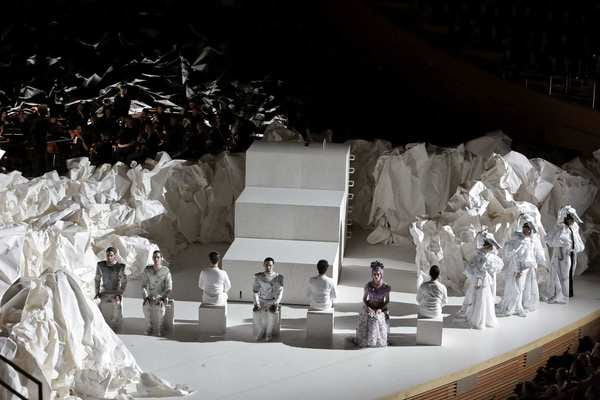
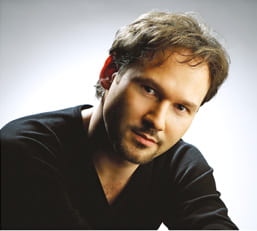 Performing the title role, Polish baritone Mariusz Kwiecień shone throughout the production. His defiant refusal to repent—even when touchingly implored by Donna Elvira (mezzo-soprano Aga Mikołaj) in Act II—was particularly impressive in its mixture of evil and bravado that was delivered with steely strength and chilling clarity. Leporello (bass Kevin Burdette) provided many entertaining moments in his role of a foolish servant who attends his master throughout his slide towards damnation.
Performing the title role, Polish baritone Mariusz Kwiecień shone throughout the production. His defiant refusal to repent—even when touchingly implored by Donna Elvira (mezzo-soprano Aga Mikołaj) in Act II—was particularly impressive in its mixture of evil and bravado that was delivered with steely strength and chilling clarity. Leporello (bass Kevin Burdette) provided many entertaining moments in his role of a foolish servant who attends his master throughout his slide towards damnation.
In general however, the minimalistic view of the director had most of the cast appear lifeless and robotic in slow-motion steps throughout the entire evening. The occasional departures from such modus operandi were either very entertaining (Mr. Kwiecień’s pelvic thrusts in Act II) or quite misguided (generally somnolent Zerlina’s Salomé-like gyrations to the strains of a Menuet). The mostly white costumes that did not distinguish between the aristocrats and peasants proved another drawback, especially since the lighting was entirely inadequate and never trained on the cast, even for their most important arias. The acoustical challenges of projecting a voice from a prone position towards a very distant ceiling (Don Ottavio flat on his back in Act II), or while singing into one’s armpit (Leporello in a fetal position during the banquet scene), compounded questionable staging choices and made everything much more difficult for the singers. The vitality and drama of Mozart’s music was clearly left to the orchestra and Maestro Dudamel to emote, since the rest of the production was static and, in the end, almost unendurably bland. A more creative lighting design could have brought Frank Gehry’s whimsical and highly artistic designs to life; a less mannered directing would have made the production faster-paced and infinitely more gripping. Excellent singing from this young and strong cast was a great bonus and Mozart’s glowing score delivered by the Los Angeles Philharmonic was as reliable as ever.
For more reviews, see the Los Angeles Times, New York Times and Wall Street Journal.
[Photo credit (top): Ricardo DeAratanha via Los Angeles Times /May 18, 2012]
Hypnotic Modernism—A Piano Recital By Grzybowski
A Review by Maja Trochimczyk
How to tell if a pianist is good enough to be worth the effort of driving on our congested freeways to attend his concert on a Friday night, if you have never heard his name before? Hard to tell… perhaps, you should believe what others say about him. You certainly should watch for the name of Maciej Grzybowski, an extraordinary Polish pianist, who recently visited Los Angeles upon the invitation of the Helena Modjeska Art and Culture Club. On May 11, 2011, he performed a solo piano recital at the First Presbyterian Church in Santa Monica. From there, he went on to play for the Polish Arts and Culture Society of San Diego and then to appear in a recitals in Canada. (In the interest of full disclosure, I have to state that as the President of the Modjeska Club I personally invited him to L.A., while his tour was sponsored by the Adam Mickiewicz Institute of Poland and supported by the Polish Consulate in Los Angeles). The specially crafted Santa Monica program included music by Polish composers (Paweł Mykietyn, Witold Lutosławski, Paweł Szymański, and Fryderyk Chopin) juxtaposed with Western classics – Johannes Brahms, Claude Debussy, and Maurice Ravel. Some of the best music of the world, played by one of the best pianists you can ever hear…
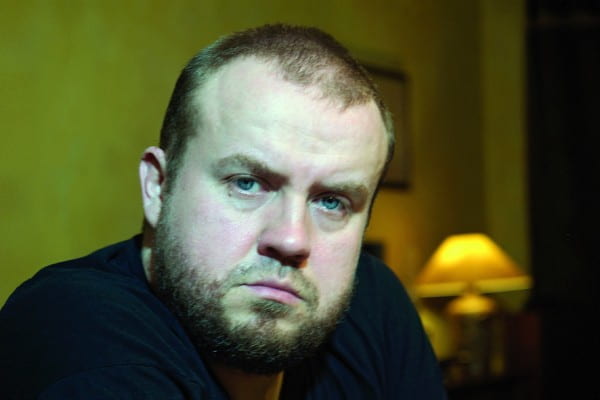 Born in 1968 and educated in Warsaw, Maciej Grzybowski is the winner of the First Prize and the Special Prize at the 20th Century Music Competition for Young Performers in Warsaw (1992). He has made numerous phonographic, radio and television recordings as a soloist and chamber musician and collaborated with Sinfonia Varsovia conducted by such conductors as Jan Krenz, Witold Lutosławski and Krzysztof Penderecki. From 1996 to 2000 Grzybowski was a co-director of the “NONSTROM presents” concert cycle in Warsaw. He took part in numerous music festivals in Poland, such as the Warsaw Autumn, Musica Polonica Nova, Witold Lutosławski Forum, Warsaw Musical Encounters, and the Polish Radio Music Festival. He also performed at the Biennial of Contemporary Music in Zagreb, Hofkonzerte im Podewil, Berlin and festivals in Lvov, Kiev, and Odessa (Ukraine). In March 2005, Grzybowski’s recital at the Mozart Hall in Bologna was recognized as the greatest music event of the 2000s.
Born in 1968 and educated in Warsaw, Maciej Grzybowski is the winner of the First Prize and the Special Prize at the 20th Century Music Competition for Young Performers in Warsaw (1992). He has made numerous phonographic, radio and television recordings as a soloist and chamber musician and collaborated with Sinfonia Varsovia conducted by such conductors as Jan Krenz, Witold Lutosławski and Krzysztof Penderecki. From 1996 to 2000 Grzybowski was a co-director of the “NONSTROM presents” concert cycle in Warsaw. He took part in numerous music festivals in Poland, such as the Warsaw Autumn, Musica Polonica Nova, Witold Lutosławski Forum, Warsaw Musical Encounters, and the Polish Radio Music Festival. He also performed at the Biennial of Contemporary Music in Zagreb, Hofkonzerte im Podewil, Berlin and festivals in Lvov, Kiev, and Odessa (Ukraine). In March 2005, Grzybowski’s recital at the Mozart Hall in Bologna was recognized as the greatest music event of the 2000s.
After Grzybowski’s U.S. debut in New York, in August 2006 EMI Classics released his second solo CD with works by Paweł Szymański (b. 1954). He also appeared in three concerts at the critically acclaimed Festival of Paweł Szymański’s Music in Warsaw. In February 2008, Grzybowski premiered a Piano Concerto by an unjustly forgotten composer, Andrzej Czajkowski (Andre Tchaikovsky).
After the 2004 release of Grzybowski’s first solo CD, Dialog, juxtaposing works by Johann Sebastian Bach, Alban Berg, Pawel Mykietyn, Arnold Schönberg and Pawel Szymanski, (Universal Music Polska), critics raved:
- “His interpretations of Bach, Berg, Schönberg, Szymański and Mykietyn show the touch of genius! There are certainly none today to equal his readings of Bach! (…) How refreshing and exciting it is to be in the presence of such great art of interpretation, akin to a genius!” (Bohdan Pociej).
- “The performance of Berg’s youthful Sonata and Schönberg’s Sechs kleine Klavierstücke could easily stand alongside the recordings of Gould or Pollini.” (Marcin Gmys).
These exorbitant expressions of praise were seconded by attendees of last month’s Santa Monica recital including composer Walter Arlen, the founder of the music department at Loyola Marymount University and for 30 years the most influential music critic of the Los Angeles Times. After the concert, he stated, “this was the best pianist I have ever heard in my life.” His praise was seconded by another listener, Howard Myers: “Maciej is a phenomenon, a marvel, a miracle, a special kind of genius.” The belief in Grzybowski’s exceptional talent is shared by the Director of the Adam Mickiewicz Institute, Paweł Potoroczyn: “He is more than just a talented pianist – he is both a virtuoso of the highest order and a great musical personality. The resultant unique combination is that of an uncommon musical genius that fully justifies comparing him with such masters as Glenn Gould or Maurizio Pollini.”
 While admitting to a personal bias towards someone who has dedicated years of his life to the music of Paweł Szymański, one of the greatest Polish composers who ever lived (as it will become apparent in 50 years, when the dust settles and musical diamonds will be found in the sea of ashes), I had no doubt that by bringing Maciej Grzybowski to California, I offered our audiences a special treat. His recital exceeded even my already sky-high expectations. First the program: arranged in two distinct parts, pairing composers of different generations in a surprising dialogue of musical ideas.
While admitting to a personal bias towards someone who has dedicated years of his life to the music of Paweł Szymański, one of the greatest Polish composers who ever lived (as it will become apparent in 50 years, when the dust settles and musical diamonds will be found in the sea of ashes), I had no doubt that by bringing Maciej Grzybowski to California, I offered our audiences a special treat. His recital exceeded even my already sky-high expectations. First the program: arranged in two distinct parts, pairing composers of different generations in a surprising dialogue of musical ideas.
The youngest of the composers featured by Grzybowski was Paweł Mykietyn (b. 1971), his colleague and co-founder of the Nonstrom Ensemble where he has played the clarinet. In an entry on the website of the Polish Music Information Centre, affiliated with the Polish Composers’ Union, Mykietyn’s style is described in the following way:
The composer ostentatiously applies the major-minor harmonies, introducing tonal fragments interspersed with harmonically free sections. He also makes use of traditional melodic structures, transforming them in his own individual manner. Mykietyn could be described as a model postmodernist, deriving his inspiration as well as material from all the available sources without any inferiority complex.
These words could well be applied to the virtuosic and wistful Four Preludes (1992) that opened the May 11 program with their contrasting moods, textures and tempi.
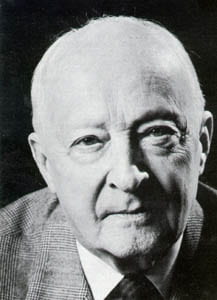 Grzybowski followed the postmodernist Mykietyn piece with Twelve Folk Melodies by the dean of Polish composers of the 20th century, Witold Lutosławski (1913-1994). Commissioned by PWM in 1945 and elevating folklore to the realm of high art (in a preview of the official ideology of “socialist realism” of 1948), these little gems show how unimportant is the ideology or context for a great compositional talent. The popular melodies ofHej, od Krakowa jadę [Hey, I come from Cracow], Na jabłoni jabłko wisi [An apple hangs on the apple tree], or Gaik [The grove] were set to music in a sophisticated harmonic style, reminiscent of Béla Bartók. Under Grzybowski’s fingers, these charming miniatures sparkled with a kaleidoscope of colors and rhythms. The pianist brought out the complexity of inner voices in seemingly simple pieces and endowed folk melodies with an aura of nostalgia and drama.
Grzybowski followed the postmodernist Mykietyn piece with Twelve Folk Melodies by the dean of Polish composers of the 20th century, Witold Lutosławski (1913-1994). Commissioned by PWM in 1945 and elevating folklore to the realm of high art (in a preview of the official ideology of “socialist realism” of 1948), these little gems show how unimportant is the ideology or context for a great compositional talent. The popular melodies ofHej, od Krakowa jadę [Hey, I come from Cracow], Na jabłoni jabłko wisi [An apple hangs on the apple tree], or Gaik [The grove] were set to music in a sophisticated harmonic style, reminiscent of Béla Bartók. Under Grzybowski’s fingers, these charming miniatures sparkled with a kaleidoscope of colors and rhythms. The pianist brought out the complexity of inner voices in seemingly simple pieces and endowed folk melodies with an aura of nostalgia and drama.
In a stroke of genius, Grzybowski followed the folk arrangements with an entirely hypnotic and modernist reading of Drei Intermezzi [Three Intermezzi], Op. 117 by Johannes Brahms (1833-1897). A standard in every music theory textbook on Schenkerian analysis, Drei Intermezzi could be heard as small interludes only in comparison with Brahms’s majestic symphonies. Composed in 1892, the intermezzi (No. 1 in E-flat major, No. 2 in B-flat minor and No. 3 in C-sharp minor) transverse cosmic landscapes of feeling evoked in Rainer Maria Rilke’s timeless poem, An Die Musik.
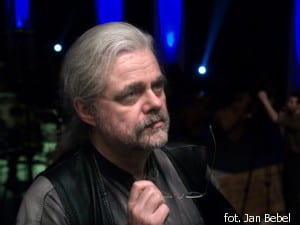 Yet it was the piece that followed—Two Etudes by Paweł Szymański (1954), written in 1986 and available on two Grzybowski CDs—that elicited the greatest enthusiasm of the audience. It is a work of genius, unparalleled in music in its hypnotic effect on the listeners. The Etudes, played without a break, contrast the slow emergence of music in the first etude with the titanic flows of sound in the second. The piece arises from silence in what appears to be a series of random, repeated notes and chords, but there is nothing random in Szymański’s music—everything is carefully constructed. Sometimes called a “neo-Baroque” composer (due to his frequent inspiration with the music of that period, and talent for creating complex polyphony), Szymański refers to his style as “sur-conventionalism” and thus describes his main approach:
Yet it was the piece that followed—Two Etudes by Paweł Szymański (1954), written in 1986 and available on two Grzybowski CDs—that elicited the greatest enthusiasm of the audience. It is a work of genius, unparalleled in music in its hypnotic effect on the listeners. The Etudes, played without a break, contrast the slow emergence of music in the first etude with the titanic flows of sound in the second. The piece arises from silence in what appears to be a series of random, repeated notes and chords, but there is nothing random in Szymański’s music—everything is carefully constructed. Sometimes called a “neo-Baroque” composer (due to his frequent inspiration with the music of that period, and talent for creating complex polyphony), Szymański refers to his style as “sur-conventionalism” and thus describes his main approach:
The modern artist, and this includes composers, finds himself tossed within two extremes. If he chooses to renounce the tradition altogether, there is the danger of falling into the trap of blah-blah; if he follows the tradition too closely, he may prove trivial. This is the paradox of practicing art in modern times. What is the way out? However, there are many methods to stay out of eclecticism despite playing games with tradition. An important method for me is to violate the rules of the traditional language and to create a new context using the elements of that language.
Thus, Szymanski draws from traditional tonal and harmonic language by playing with the conventions of musical styles and with the listeners’ expectations. This game of cat-and-mouse was apparent in the stretching and constricting of time in the two Etudes. The irregularity of recurring chords and notes piqued the listeners’ interest and intensified their expectations. Thus, the music grew and expanded in scope in the first Etude, to reach monumental proportions and then dissolve in massive complexities of the second.
The second half of the recital started with a series of unusual readings of Fryderyk Chopin’s four mazurkas (in A Minor, Op. 7, No. 2; E Minor, Op. 41, No. 1; F Major, Op. Posth. 68, No. 3; G-sharp Minor, Op. 33, No. 1). The originality of the pianist’s interpretations rendered these well-known gems of the repertoire almost unrecognizable. More angular and modernist than usual were also three Preludes from the second volume of impressionistic masterpieces by Claude Debussy (1862-1918): II … Feuilles mortes, VI … „General Lavine” eccentric; VII … La terrasse des audiences du clair de lune. These terraces were lighted less by effervescent moonlight than by the brilliant focused light of Grzybowski’s intellect. Again, they were so different from what I was used to hearing that I would need to hear these preludes again, in order to render an opinion. Yet, the rest of the audience was hypnotized into a complete silence and immobility: no slow, tortuous opening of candy wrappers at this recital!
The finale was indeed “grand”—a monumental rendering of Valses nobles et sentimentales by Maurice Ravel (1875-1937). In 1906, Ravel started his “waltz” project, culminating with the 1919 publication of the orchestral suite, La Valse. Inspired by the noble and sentimental waltzes by the Viennese Franz Schubert, Ravel published a suite of eight pieces for piano in 1911 and followed them with orchestral versions a year later. The waltzes are not separated into distinct “noble” and “sentimental” sections; it is up to the listener to decide what is what. The pieces, in contrasting tempi, span the whole expressive trajectory for which words are too limited to give the music full justice. An unusual selection to close a solo recital, the suite ended in a slow tranquil dissolution into silence.
After a well-deserved standing ovation, the pianist relented and added a melancholy and thoroughly modern version of a Scarlatti’s sonata as an encore to the evening’s inspired and inspiring program. One thing is certain: the name recognition problem mentioned at the beginning should be resolved, once for all, in the case of Maciej Grzybowski: just go to every concert of his, and if you cannot go, buy his CDs.
[Sources: polishculture-nyc.org, polmic.pl, usc.edu]
Quaardvartet Tour
by Alexandra Masłowska
The article below was translated with permission by the original publisher, meakultura.pl, a new online platform dedicated to music, education, artists and culture.
On May 9, Quaardvarktet embarked on a concert tour, appearing at some of the most important jazz clubs in Poland. Meakultura was the media patron of Quaardvarktet’s most recent tour. But who are the musicians who created a group with such an intriguing name?
The origins of the group date two years back; also at the same time, at the end of 2010 and the beginning of 2011, the Aardvark Trio was founded in Zielona Góra. According to guitarist Piotr Lipowicz, “Aardvark is a little-known mammal living in the savanna who we think is an amalgamation of the anteater, pig and kangaroo, which perfectly illustrates different personalities in the group.” After the trumpet player, Paweł Południak, joined the group at the beginning of 2012, the setup for the group now known to the listeners as Quaardvarktet (a fusion of “quartet” and previously mentioned “aardvark”) was complete. The groups members are: Paweł Południak (Music Academy in Katowice, PWSZ in Nysa) – trombone; Piotr Lipowicz (Music Academy in Katowice) – guitar; Paweł Wszołek (Music Academy in Krakow) – bass; and Piotr Budniak (Music Academy in Katowice) – drums.
Quaardvarktet represents a new wave of Polish jazz. Within the lively compositions by these four young musicians we can try to find influences of pop, ethnic or indie music. Aaron Parks, Bill Frisell, Brian Blade, Christian Scott or Julian Lage are among the artists who influence these musicians.
According to Piotr Lipowicz, “Modern jazz is the best way to articulate the entire mass of inspirations and influences which shape our compositions and the sound of the ensemble.”In fact, the style which has been presented by the musicians is a fusion of fresh ‘young blood’ and European tradition of jazz. The group’s instruments are used to their limits during the quartet’s concerts, which showcase the skills of each member in the form of unforced and free improvisation.
From the beginning, the group began to concertize methodically in jazz clubs throughout the country. The Quaardvarktet’s own lively standards were performed often on various music festivals in Poland, including the Zaduszki Jazz Festival in Kraków. The onstage experience gained by the group during their numerous performances is yet another of the group’s strong assets, as the Quaardvarktet’s playing betrays neither shadow of a doubt nor stage fright.
Apart from the first independent concert tour last February, their latest accomplishments also include the publication of their debut album full of original compositions in April (see quaardvarktet.bandcamp.com for details). The group’s most recent tour (May 9-22) gave audiences from every corner of Poland the chance (for the first time or again) to participate in the shows prepared by the group. Cities and clubs included in the Quaardvarktet tour were: Katowice (Colors of Taste), Poznań (Blue Note), Zielona Góra (Hydrozagadka), Gorzów Wielkopolski (Filary Jazz Club), Nowa Sól (Kaflowy), Wrocław (Collosseum Jazz Cafe), Zgorzelec(Afirmacja), Kraków(PiecArt Jazz Club), Rzeszów (Stara Drukarnia), Warsaw (Cud nad Wisłą), and Rybnik (Kulturalny Club).
[Source: meakultura.pl]
View Taborowska Premiere Online
 A video from the premiere performance of Emfaza for violin and orchestra by the Polish composer Katarzyna Taborowska (b. 1974) is now available online. The work was performed on March 24 by violinist Anna Zielinska and the Symphony Orchestra of the Poznań Music Academy during the Poznań Spring Contemporary Music Festival
A video from the premiere performance of Emfaza for violin and orchestra by the Polish composer Katarzyna Taborowska (b. 1974) is now available online. The work was performed on March 24 by violinist Anna Zielinska and the Symphony Orchestra of the Poznań Music Academy during the Poznań Spring Contemporary Music Festival
[Source: press release]
Mykietyn In Rome
On the initiative of the Polish Institute in Rome, Paweł Mykietyn’s music was presented in Italy for the first time during the 10th festival of Polish culture, Corso Polonia (May 10 – June 7). On 31 May in the Casella Hall, selected chamber music pieces representative of Mykietyn’s work were presented. Entitled “Highly Strung Emotions,” the program included: Epiphora for piano and tape, Sonata for cello, Shakespeare’s Sonnets for male soprano and piano, An Album Leaf for cello and tape, and Jeśli przyjdzie Katelbach for tape. They will be performed by Andrzej Bauer (cello), Joanna Wicherek (piano), Michał Sławecki (male soprano) Ewa Guziołek-Tubelewicz (sound engineering).
In addition to the concert, the evening included a meeting with the composer led by Sandro Cappelletto, a well-known musicologist, music critic and artistic director of the Accademia Filarmonica Romana, and a showing of the movie Tatarak [Sweet Rush] by Andrzej Wajda for which Mykietyn composed the music. The event was organized in collaboration with the Accademia Filarmonica Romana, one of the most important musical institutions in Rome. A day earlier, on May 30, Mykietyn also led a masterclass for composition students from the class of Matteo D’Amico in Rome’s Santa Cecilia Conservatoire.
[Source: pwm.com.pl]
Performances @ the KF
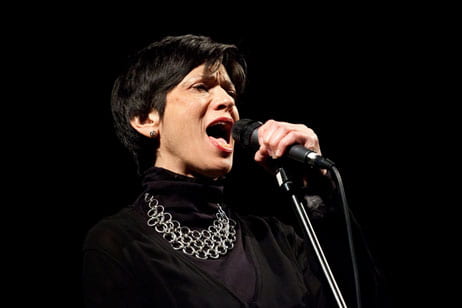 A rare US appearance by the exceptional singer and driving force behind the renovation of the historic White Stork Synagogue in Wrocław, Poland, Bente Kahan presented a concert at the Kosciuszko Foundation in New York on Wednesday, May 30. Entitled “Home,” the program presented her personal musical history via the exquisite tapestry of Jewish song in Europe.
A rare US appearance by the exceptional singer and driving force behind the renovation of the historic White Stork Synagogue in Wrocław, Poland, Bente Kahan presented a concert at the Kosciuszko Foundation in New York on Wednesday, May 30. Entitled “Home,” the program presented her personal musical history via the exquisite tapestry of Jewish song in Europe.
This event was dedicated to raising funds for an academic position in Holocaust Studies at the Jewish Studies Department of Wrocław University.
Following the concert, Professor Emeritus, Abraham Ascher (CUNY), author of Community Under Siege about the Jews of Breslau (now Wrocław) under Nazi rule, will discuss the enormous potential of the Wrocław Archives. Bente Kahan will discuss the Synagogue and her Foundation, and Dr. Barbara Pendzich will talk about the Jewish Studies Department.
A New Kaleidoscope of Polish Songs
On Thursday, May 31, the Polish Theatre Institute in the USA presented excerpts from musicals “Reprise of the Red Ridinghood”, “Shop of Songs”, and “Cabaret of the great Three.”
[Source: thekf.org; Photo credit: Joanna Stoga via bentekahan.eu]
A Polish May In The US
May is a month of celebration throughout Poland and amongst members of the Polish diaspora around the world. Many of the events mark secular celebrations of culture and nationhood, such as Majówka [May outing] – picnics throughout the month, Święto Polonii [Polonia Day] – May 2, Święto Flagi Polskiej [Polish Flag Day] – May 2, Święto Trzeciego Maja [Polish Constitution Day] – May 3, as well as celebrations corresponding to events and feasts of the Catholic calendar.
Below is a listing of a few of this year’s musical celebrations of the important early days of May in Polish culture that took place in the US:
CONSTITUTION CELEBRATION (San Francisco)
An annual event organized by the Polish American Congress, Northern California and the Polish Folk Ensemble Łowiczanie of San Francisco, performing with the Golden Gate Park Band and the children of the Polish Language Schools of Union City and Walnut Creek. Division cordially invites everyone to enjoy Polish music and colorful dancing at our annual Polish Concert at the Music Concourse at the Golden Gate Park. Afterwards, the S.F. Polish Club will host Polish food and a film screening of 1920 Bitwa Warszawska.
Sunday, May 6th | 1-3 pm
May 3rd Łowiczanie Celebration
The Band Shell at Golden Gate Park
50 Hagiwara Tea Garden Dr., San Francisco, CA
Sunday, May 6th | 3:30
Afterparty at the Polish Club
3040 22nd St., San Francisco, CA
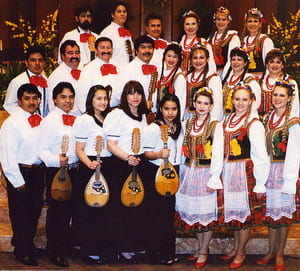 MEXICAN & POLISH MUSIC (Chicago)
MEXICAN & POLISH MUSIC (Chicago)
Lira Ensemble presents its annual, award-winning joint celebration of Mexico’s Cinco de Mayo and Poland’s May 3rd Constitution Day on May 6, 2012. It will be performed by the Cuerdas Clasicas String Ensemble and the Lira Singers.
Sunday, May 6th | 4PM
Cinco de Mayo & May 3rd Constitution Day Concert
St. Bruno Church – 4751 S. Harding, Chicago, IL
For more details, visit: www.liraensemble.com
ADMISSION & PARKING ARE FREE
For other, non-musical events, see also Polish Constitution Day Parade (Chicago), PAC Ohio – Weekend of Events (Parma, OH), and Celebrations in Pennsylvania.
Discography
New on NAXOS
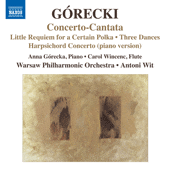 GÓRECKI
GÓRECKI
Henryk Mikołaj Górecki (1933-2010): Concerto-Cantata, Op. 65; Three Dances, Op. 34; Male requiem dla pewnej polka [Little Requiem for a Polka], Op. 66; Harpsichord Concerto, Op. 40 (piano version)
Anna Górecka, piano; Carol Wincenc, flute; Warsaw Philharmonic Orchestra; Antoni Wit, cond.
Naxos 8.572872
These four works, written between 1973 and 1993, fully reflect Górecki’s expressive variety. The Little Requiem for a Polka, for piano and thirteen instruments, combines a wide range of moods. The Concerto-Cantata, which received its world première from the soloist on this recording, alternates a moving vein of melancholy with a charged, violent energy. The radical, energetic Harpsichord Concerto is heard here in the version for piano, performed by the composer’s daughter. The Three Dances are hugely approachable and full of exciting contrast.
 ALL SHALL BE WELL – Choral Music: Exultate Singers
ALL SHALL BE WELL – Choral Music: Exultate Singers
Roxanna Panufnik – All Shall be Well; Henryk Mikołaj Górecki – Totus Tuus, Op. 60; Gustav Holst – Nunc dimittis; Ralph Vaughn Williams – Valiant for Truth; Sergei Rachmaninov – All-night Vigil “Vespers”, Op. 37: “Hail, O Virgin Mother (Ave Maria)”; John Tavener – Svyati, “O Holy One”; Jaakko Mantyjarvi – O magnum mysterium; Pierre Villette – Hymne a la Vierge, Op. 24; Knut Nystedt – Stabat Mater, Op. 111
Exultate Singers; David Ogden, conductor
Naxos 8.572760
This wide-ranging program offers connections and contrasts in music of devotion and consolation. The settings by life-long friends Holst and Vaughan Williams, whilst very different, are highly affecting. The music of Rachmaninov, whose hymn derives from his 1915 All-Night Vigil, and John Tavener is immersed in the ritual of the Russian Orthodox Church. Marian Prayers come from Pierre Villette and Knut Nystedt.
The music that gives its name to the title of the disc is by British composer Roxanna Panufnik (b. 1968), the daughter of the composer and conductor Sir Andrzej Panufnik. She studied composition at the Royal Academy of Music, and has written a wide range of pieces including opera, ballet, music theatre, choral works, chamber compositions and music for film and television.
All Shall Be Well was commissioned by Exultate Singers for a concert marking the twentieth anniversary of the fall of the Berlin Wall and was given its première in Clifton Cathedral, Bristol on 8 November 2009. Roxanna Panufnik says of the work:
For this piece I chose two fourteenth-century texts which I had been longing to set: Bogurodzica, a plainsong hymn which Polish knights sang as they went into battle and a passage from Julian of Norwich’s Divine Revelations—the profoundly comforting words spoken to her by God in chapter 32: All things shall be well. When I looked closely at these two texts together, I noticed that they seemed to form a conversation. The knights’ plea for safety in victory and ‘paradise’ (ie heaven) after life, are answered by God’s /Julian’s comforting assurance ‘…that all manner of thing shall be well. Have faith, and have trust, and at the last day (i.e. the day you die) you shall see it all transformed into great joy.’ This conversation is represented with two choirs in stereo, around a solo cello—the latter often taking the main melodies and sometimes contributing gusto to the lowerpitched bass lines. From the last four lines of Bogurodzica—‘Hear the prayer we offer’—all Polish and Middle English words change into modern English as the conversation becomes ardent and cohesive, concluding in ‘paradise’ and ‘great joy’.
The work is dedicated to Exultate Singers and the memory of my father, Sir Andrzej Panufnik, who never thought he would live to see the Berlin Wall come down and be able to return to his native Poland—but he did return in 1990, the year before he died.
[Sources: press release, naxos.com]
New on DUX
 Laks, Słowiński and Pstrokońska-Nawratil
Laks, Słowiński and Pstrokońska-Nawratil
Władysław Słowiński – Concerto for flute and symphony orchestra, piano and percussion; Szymon Laks – Symphonie pour cordes; Grażyna Pstrokońska-Nawratil – …como El sol e la mar… [As the Sun and the Sea] for flute, alto flute and chamber orchestra from the cycle Thinking of Vivaldi (“Summer”)
Łukasz Długosz – flute; Chamber Orchestra of the National Philharmonic; Krzysztof Słowiński – cond.
DUX 0737
The first piece on the album—Concerto for Flute by Władysław Słowiński—was composed in 1956-57 and is in the neoclassical style. According to the publisher, PWM:
The composer informs us that in accordance with the principles of classicism, the first movement is in sonata allegro form, the second—three-part song form, the third—rondo form. “In this youthful piece,” says W. Słowiński, “I tried to create something for the soloist to show off with by using various forms of musical expression. From grotesquery to melodic expression, from lyricism to rapidity—making it possible to show the technical capability of the instrument.”
 Piotr Moss: Elan, Concertino, Canti, Capriccio, Fantaisie
Piotr Moss: Elan, Concertino, Canti, Capriccio, Fantaisie
Piotr Moss (b. 13 May 1949): Elan for strings (1990); Concertino for two violins, two string quartets and double-bass (1984); Cantifor flute and strings (1992); Capriccio for piano and strings (1994); Fantaisie for cello and strings (1996)
Andrzej Bauer – cello, Véronique Briel – piano, Elżbieta Gajewska – flute, “Amadeus” Polish Radio Chamber Orchestra – Agnieszka Duczmal, cond.
DUX 0879
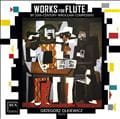 Works for flute by 20th century Wrocław composers
Works for flute by 20th century Wrocław composers
Jacek Rogala: Litoral for flute and piano; Leszek Wisłocki: 10 Preludes for flute and piano; Grażyna Pstrokońska-Nawratil: Eco per flauto; Jadwiga Szajna-Lewandowska: Sonatina for flute and piano; Joachim Georg Görlich: Zwölftoneindrücke für Flöte und Klavier op. 9; Mirosław Gąsieniec: Capriccio; Mirosław Gąsieniec: Spanish Dance
Mirosław Gąsieniec – piano, Andrzej Jungiewicz – piano, Grzegorz Olkiewicz – flute, Maria Szwajger-Kułakowska – piano, Teresa Worońko – piano
DUX 0826
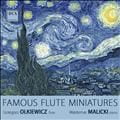 Famous Flute Miniatures
Famous Flute Miniatures
Works by Stanisław Moniuszko, Krzysztof Penderecki, Fryderyk Chopin and others
Waldemar Malicki – piano, Grzegorz Olkiewicz – flute
DUX 0829
 PADEREWSKI : MANRU (complete opera) on DVD
PADEREWSKI : MANRU (complete opera) on DVD
Choir, Ballet & Orchestra of the Opera Nova in Bygdoszcz – Maciej Figas, cond.
DUX 9793
[Sources: press release, dux.pl, pwm.com.pl]
Anniversaries
Born This Month
-
June 1, 1909 – Maria DZIEWULSKA, composer and theoretician (d. 2006)
-
June 4, 1845 – Aleksander POLIŃSKI, music historian (d. 1916)
-
June 4, 1784 – Adam CZARNOCKI, music ethnographer (d. 1825)
-
June 5, 1865 – Felicjan SZOPSKI, composer and music critic (d. 1939)
-
June 6, 1929 – Bogusław SCHAEFFER, composer, writer
-
June 12, 1897 – Aleksander TANSMAN, composer and pianist,
-
June 16, 1923 – Henryk CZYŻ, conductor and composer
-
June 17, 1930 – Romuald TWARDOWSKI, composer
-
June 28, 1895 – Kazimierz SIKORSKI, composer and teacher
-
June 28, 1904 – Włodzimierz POŹNIAK, musicologist
Died This Month
-
June 1, 1869 – Jozef DULEBA, pianist and participant of January Uprising, died in a duel (b. 1843)
-
June 3, 1904 – Daniel FILLEBORN, singer and performer of main parts in Moniuszko’s operas (b. 1841)
-
June 4, 1872 – Stanislaw MONIUSZKO, Father of Polish National opera (b. 5 May 1819)
-
June 5, 1964 – Henryk SZTOMPKA, pianist, Chopin specialist, teacher
-
June 9, 1932 – Natalia JANOTHA, pianist and composer, student of Clara Wieck-Schumann, Royal Pianist in London, 400 opus numbers (b. 1856)
-
June 10, 1953 – Grzegorz FITELBERG, conductor, composer, great promoter of new music, esp. Szymanowski (b. 1879)
-
June 28, 1938 – Ludwik DRZEWIECKI, pianist and father of Zbigniew Drzewiecki
-
June 29, 1945 – Kazimierz GARBUSINSKI, pianist, organist, composer
-
June 30, 1957 – Michal SWIERZYNSKI, composer and choral conductor

